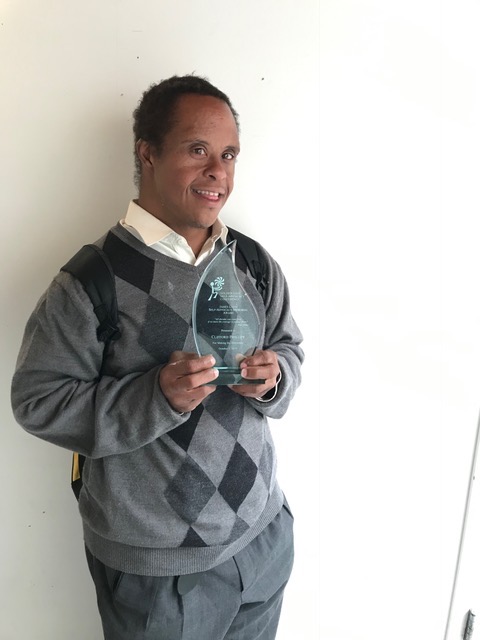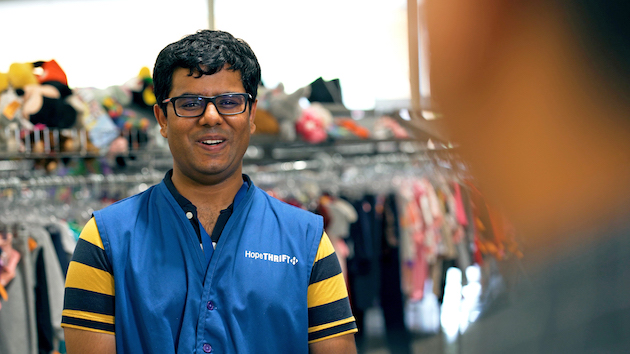Achieving Lifelong Independence for People with Disabilities

San Francisco, Sep 16 (IPS) - Vernae Gallaread aspires to teach sign language to people with disabilities and to families who cannot afford sign language lessons for their children.
Gallaread has an intellectual and developmental disability, but that doesn’t stop her from pursuing her dreams. She initially self-taught herself sign language through a book that her mother bought.
At The Arc San Francisco, where she works as a receptionist and a board member, Gallaread develops her sign language skills through a class the organization offers.
As a board member, Gallaread can voice her opinions and discuss the organization’s policies, improvements, and participants’ ideas.
“The Arc San Francisco has impacted my life because I got to show my independence. They taught me to have confidence in myself, be a self-advocate, and speak up for myself,” says Gallaread.
The Arc San Francisco’s mission is to partner with adults with intellectual and developmental disabilities and transform communities through lifelong learning and self-determination.
The organization offers person-centered services that include workforce development, education, wellness programs, and even art and recreational programs. Workforce is one of its pillars but not the main one.
The Arc San Francisco’s workforce development program is focused on competitive integrated employment – meaning that participants get competitive jobs compensated as they would for a more traditional candidate.

Participants go through a paid internship before deciding what field they are interested in pursuing. By collaborating with a team of specialized job developers, The Arc San Francisco encourages participants to look at their needs—whether they need full-time or part-time employment, their skill sets, and their passions. After making their decision, participants will receive help from a job developer navigating their job search.
“What we have found in the last eight to 10 years is that we have corporations coming to us, looking for talent. We’ve been pounding the pavement looking for jobs for folks. This has been an interesting development. That we’re seen as a talent pipeline, which is wonderful,” Kristen Pederson, Executive Director at The Arc San Francisco, reflecting on its workforce development program.
In addition to its workforce development program, The Arc San Francisco has an adult education program. Depending on the participant’s needs, the organization will provide individualized services for its participants and ensure that they are reaching the goals that they have set for themselves.
Clifford Phillips, a participant at The Arc San Francisco with an intellectual and developmental disability, is a member of the adult education program. He volunteers for the homeless, sings as part of the gospel choir, and shops at Safeway for his fellow participants.
Through the organization, Phillips teaches a black history class, in which Gallaread is also enrolled. He dreams of becoming a teacher who will stand up for everyone and make a change.
“People out there don’t care about us. When people tease us, I will stand up for myself. I want to help people and be a strong African American man who will stand up for everybody,” Phillips says, articulating his passion.
California is the only state that has mandated services for people with developmental disabilities. The Lanterman Developmental and Disabilities Services Act was enacted in 1969. This law states that services and supports are “available to persons with developmental disabilities, including innovative services and supports, the standard agreement contract between the department and regional centers and purchase-of-service policies, and information and training on protecting the rights of consumers at administrative hearings.”
People who have disabilities can go to regional centers in California and qualify for different services that the centers offer, such as counseling, educational training, family support, and many others.

Another organization that aids people with intellectual and developmental disabilities is Hope Services. The organization was founded in 1952 by a group of parents who had children with disabilities. They wanted to have their children at home while also giving them access to education. The organization currently serves over 3,600 individuals every year and is in eight counties in California.
Hope Services has a variety of programs that range from education to housing, but its popular program is the community employment program. The organization initially helps its participants individually by finding out what their interests and skill sets are. Afterward, it finds jobs that fit best with the participants. If extra help is needed, Hope Services has staff that can support participants on the job until they fully understand and learn the tasks and responsibilities.
“Some individuals might need long-term support. For instance, we have a group of four people that work at Home Depot right now. There is a staff that is there all the time with them and goes from one person to another to give them the support that they need throughout the day,” Cathy Bouchard, Specialty Director at Hope Services, explained.
Hope Services founded jobs for over 300 people. One of its successes includes its thrift stores, HopeTHRIFT. People can donate used goods, and HopeTHRIFT will sell those goods to generate revenue for Hope Services. HopeTHRIFT furthers Hope’s mission by providing career opportunities and job experience for its clients.
When asked about her time working at Hope Services, Bouchard described it as the best thing that happened to her. “It really solidified the fact that every individual, regardless of the level of disability, has a contribution to make and a family that loves and cares for them,” Bouchard reflected.
IPS UN Bureau Report
Follow @IPSNewsUNBureau
Follow IPS News UN Bureau on Instagram
© Inter Press Service (2022) — All Rights Reserved. Original source: Inter Press Service
 Global Issues
Global Issues